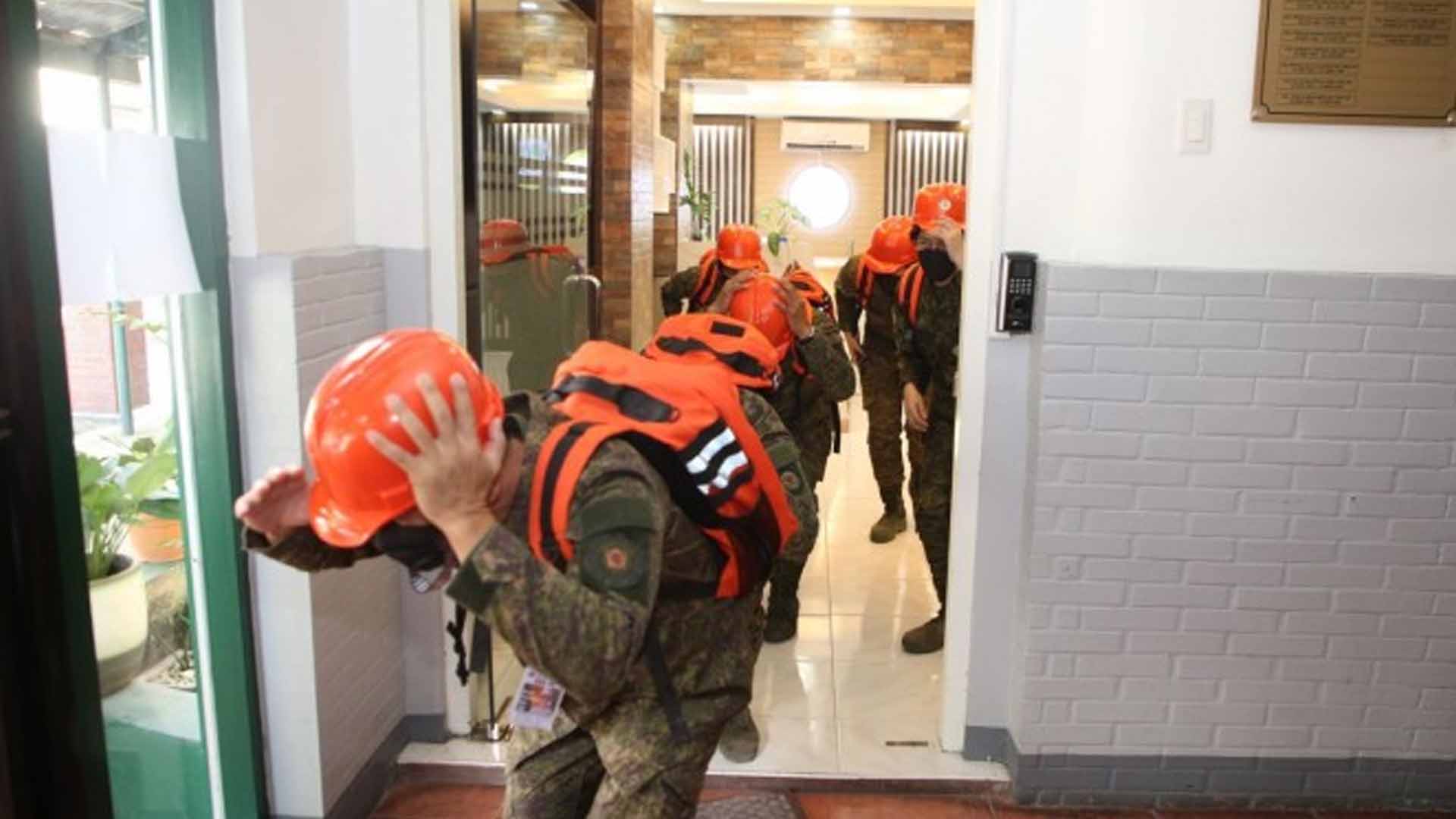Newly-appointed Department of National Defense (DND) Secretary Gilberto “Gibo” Teodoro Jr. said Thursday public participation in the quarterly Nationwide Simultaneous Earthquake Drill (NSED) would provide participants with the necessary lifesaving skills should a major quake strike the country.
“Sa pagsasagawa ng pag-duck, cover, and hold, (nalilinang) natin ang ating kasanayan at kahandaan upang kahit anumang oras lindol, alam natin ang tamang gagawin para iligtas ang ating sarili at mga mahal sa buhay (By frequently practicing the duck, cover, and hold, we hone our skills and readiness so that should an earthquake strike or occur anytime, we can implement emergency procedures that help save ourselves and our loved ones),” Teodoro said in his message read by Defense Undersecretary Angelito de Leon.
Teodoro, who also chairs the National Disaster Risk Reduction and Management Council, also hailed participants for taking time to participate in the second of the four NSEDs scheduled for this year.
“Patuloy po tayo sa pagsasagawa ng NSED upang patibayin ang kahandaan ng sambayanan laban sa panganib ng lindol (We will continue to conduct the NSED to enhance public readiness against the threat of earthquakes),” he added.
The ceremonial pressing of the button that signaled the start of the second quarter NSED was held at the Greenfield District in Mandaluyong City at 9 a.m. on Thursday.
The scenario involved a magnitude 7.2 earthquake and subsequent response.
Teodoro thanked Mandaluyong’s city government along with its city council, ranking officials and employees led by Mayor Benjamin Abalos Sr., the regional offices of the Office of Civil Defense (OCD), participating local government units, local and national government agencies, schools and universities, those from the private sector, and other stakeholders.
He also urged the public to continue participating in such activities as the NSED, which aim to protect communities from natural and man-made calamities.
The OCD earlier underscored the need for further cooperation between the private and public sectors to mitigate the possible damage that could be caused by a massive earthquake.
“We want to emphasize once more the importance of the whole-of-nation approach in disaster risk reduction and management (DRRM). In this earthquake preparedness activity, we advocate for a united effort between the government, the private sector, and the public,” OCD administrator Undersecretary Ariel Nepomuceno said.
He added that the NSED aims to “continuously strengthen” the country’s earthquake preparedness.
“We are inviting everyone to join the drill and do the duck-cover-hold technique at the sounding of the siren as part of our continuing effort to build community preparedness for earthquake emergencies,” he said.
Bring quake drills to communities
Meanwhile, Interior Secretary Benjamin Abalos Jr. said the Nationwide Simultaneous Earthquake Drill (NSED) should be also done at the barangay level, especially in Metro Manila.
“Dapat ito ibaba sa barangay level dahil iisipin natin, ito ay buong Metro Manila so lahat talagang busy. Kung minsan iisipin mo sarili mong pamilya kaya pinapakita namin ito ang ideal scenario pero importante up to the barangay level paghandaan nila kaya nga kinakausap ko yung mga barangay, maghanda sila ng mga tao (It should be brought down to the barangay level because let’s think about it, it’s the whole of Metro Manila so everyone is really busy. If you sometimes think about your own family, we are showing this as the ideal scenario, but it is important up to the barangay level that they prepare, that is why I am talking to the barangays, they should prepare people),” Abalos said in an interview with reporters on the sidelines of the 2nd quarter NSED in Mandaluyong City Thursday.
The DILG chief also prodded the local government units (LGUs) to religiously educate their constituents in practicing earthquake drills to prepare them for unfortunate emergency situations.
“Dapat pagkatapos yung emergency response, dapat na gagawin ng mga national agencies, ng kapulisan, NDRRMC (National Disaster Risk Reduction Management Council), ngunit may malaking papel ang LGUs dito lalo na ang barangay na dapat i-train nila sa ibaba (The emergency response should come next, the national agencies, police force, NDRRMC, but the LGUs play an important role especially in training the barangays at the grassroots level),’’ Abalos said.
He added the barangays should share the responsibility of inspecting the buildings with the local government units (LGUs) in their respective jurisdictions to check the stability of all the structures in their localities.
Abalos stressed that sometimes there are misconceptions that high-rise buildings are mostly prone to collapse but insisted that low-rise structures may topple during earthquakes.
Due to these circumstances, Abalos pointed out the need for the barangays to assist and regularly coordinate with the LGUs in checking the structural stability of all the buildings in their areas.
In a meeting with the LGU officials, Abalos said that they discussed that the Big One or a high-magnitude tremor occurs every 400 years which is now nearing this time.
He noted that the whole country must be aware when an earthquake of high intensity or magnitude strikes a particular area nationwide.
Abalos explained that other LGUs may immediately provide the appropriate assistance to the distressed localities hit by the earthquake.
Compared to the late 1960s when Metro Manila has wide spaces, Abalos pointed out that the region is now under a high-intensity level with an ever-increasing population.
With this development, Abalos mentioned that quick responses during emergency situations where time is of the essence are very valuable.
He described the K-9 units as “life savers”, saying that he enlisted the services of private canines and had them trained for rescue operations during his time at the Metropolitan Manila Development Authority (MMDA).
Abalos also cited the importance of “manpower inventory and equipment” to determine if the workforce and equipment are enough to respond to emergency situations. (PNA)




















